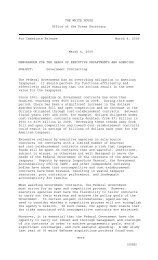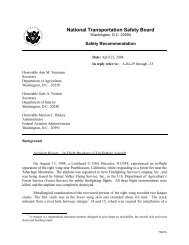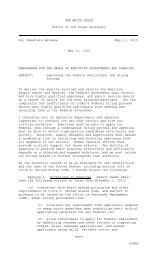Accenture's fifth annual global e-government study
Accenture's fifth annual global e-government study
Accenture's fifth annual global e-government study
Create successful ePaper yourself
Turn your PDF publications into a flip-book with our unique Google optimized e-Paper software.
Under Japan’s new eGovernment action plan the<br />
existing eGovernment portal, www.e-gov.go.jp, is<br />
scheduled to be revamped with a more user-centric<br />
focus. As it exists now, the portal offers several<br />
different agency-focused search types and links<br />
to <strong>government</strong> websites. However, the changes<br />
are already beginning to take place. As part of an<br />
enhancement in January 2004, guidance and navigation<br />
for online applications for administrative<br />
processes moved to a user-intention-based organization.<br />
This first step will now be extended across<br />
other <strong>government</strong> information and services. By<br />
2005, the <strong>government</strong> plans to have the portal provide<br />
services in a more convenient, intelligible way,<br />
with a focus on quality rather than quantity. There<br />
is explicit reference to “one-stop” services for both<br />
citizens and businesses.<br />
While the central portal itself is not fully customer<br />
centric, Japan has a number of innovative, customer-friendly<br />
services worth noting. The<br />
multipayment network was developed through<br />
cooperation between the public and private sectors<br />
and launched in January 2004. Through the Payeasy<br />
service of this network system, citizens and<br />
businesses will be able to pay fees or taxes to<br />
<strong>government</strong> within a secure environment. e-Tax<br />
(www.e-tax.nta.go.jp) is the first big service that<br />
will use this system and the number of <strong>government</strong>al<br />
services accepting Pay-easy will increase<br />
in the future.<br />
of national and local <strong>government</strong> agencies and the<br />
obligations of private companies. The law will be<br />
enforced within two years.<br />
To encourage adoption of eGovernment, the<br />
Japanese <strong>government</strong> has instituted an <strong>annual</strong><br />
Systemized Administration Week every October.<br />
The events promote eGovernment to the public,<br />
increase employee motivation and bring together<br />
different <strong>government</strong> organizations in an opportunity<br />
to collaborate. Typical activities during the week<br />
include broadcasting commercials, holding seminars<br />
and symposiums, gathering citizen feedback and<br />
awarding prizes for promoting eGovernment.<br />
While Japan has intensified its efforts and made significant<br />
advances both in developing its customer<br />
focus and promoting eGovernment adoption, it has<br />
room for further improvement still. Japan ranked<br />
19 out of 22 countries in customer relationship<br />
management maturity this year. Looking ahead to<br />
the rest of 2004 and beyond, if Japan develops its<br />
customer focus with the same concerted effort it<br />
used to build its strong eGovernment breadth and<br />
depth, then the country will be positioned for even<br />
more significant advances in its overall maturity.<br />
The Sogyo Navi (Starting Business Navigator) portal,<br />
www.sogyo-navi.jp/index.html, is a one-stop shop for<br />
users to obtain information about starting a business.<br />
Sogyo Navi was developed to examine the feasibility<br />
of a one-stop process for applications and transactions<br />
enabled by cooperation between the public<br />
and private sectors, and to explore the best ways<br />
to develop a user-focused portal. The portal was<br />
developed with collaboration between the national<br />
<strong>government</strong> and the private sector, led by the<br />
Ministry of Economy, Trade and Industry. Online<br />
filing will be operational in the future.<br />
The importance of protecting personal information<br />
has increased along with the popularity of IT in<br />
Japan. In 2003, the Diet passed a personal data<br />
protection law to establish basic requirements for<br />
handling personal information, the responsibilities<br />
83













